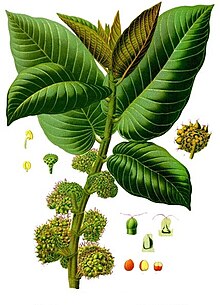Castilla elastica, the Panama rubber tree, is a tree native to the tropical areas of Mexico, Central America, and northern South America.[3] It was the principal source of latex among the Mesoamerican peoples in pre-Columbian times. The latex gathered from Castilla elastica was converted into usable rubber by mixing the latex with the juice of the morning glory species Ipomoea alba which, conveniently, is typically found in the wild as a vine climbing Castilla elastica. The rubber produced by this method found several uses, including most notably, the manufacture of balls for the Mesoamerican ballgame ōllamaliztli.
| Castilla elastica | |
|---|---|

| |
| Scientific classification | |
| Kingdom: | Plantae |
| Clade: | Tracheophytes |
| Clade: | Angiosperms |
| Clade: | Eudicots |
| Clade: | Rosids |
| Order: | Rosales |
| Family: | Moraceae |
| Genus: | Castilla |
| Species: | C. elastica
|
| Binomial name | |
| Castilla elastica Cerv.
| |
| Synonyms | |
| |
The Nahuatl word for rubber was ulli / olli, from which their word for the ballgame derived), and also their name for the ancient people they associated with the origin of the ballgame, the Olmecs (olmeca: "rubber people"). The Nahuatl word for the tree of Castilla elastica is olicuáhuitl;[4] in Spanish it is known as palo de hule.
Subspecies edit
- Castilla elastica ssp. costaricana (Liebm.) C.C.Berg
- Castilla elastica ssp. elastica
Vernacular names edit
Caucho, castilloa rubber.
See also edit
- Guayule - another source of latex utilized by the pre-Columbian Mesoamericans
- Para rubber tree - the main source of modern commercial natural latex
References edit
- ^ Linares, J. & Condit, R. (2021). "Castilla elastica". IUCN Red List of Threatened Species. 2021: e.T150843489A175886925. Retrieved 14 March 2023.
- ^ "Castilla elastica Cerv. — the Plant List".
- ^ "Castilla elastica". Germplasm Resources Information Network. Agricultural Research Service, United States Department of Agriculture. Retrieved 2009-10-16.
- ^ "Castilla elastica" (PDF). Comisión Nacional para el Conocimiento y Uso de la Biodiversidad.
External links edit
- Wimmer, Alexis (2006). "Dictionnaire de la langue nahuatl classique" (online version). (in French and Nahuatl languages)
- Zidar, Charles (2006). "Ancient Maya Botanical Research" (online database). Foundations for the Advancement of Mesoamerican Studies, Inc. Retrieved 2007-06-13.
